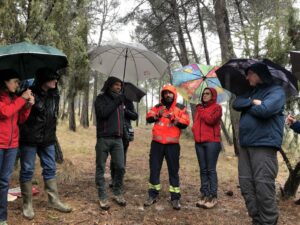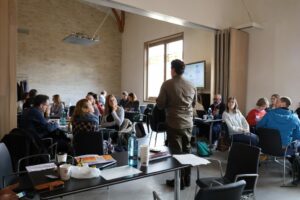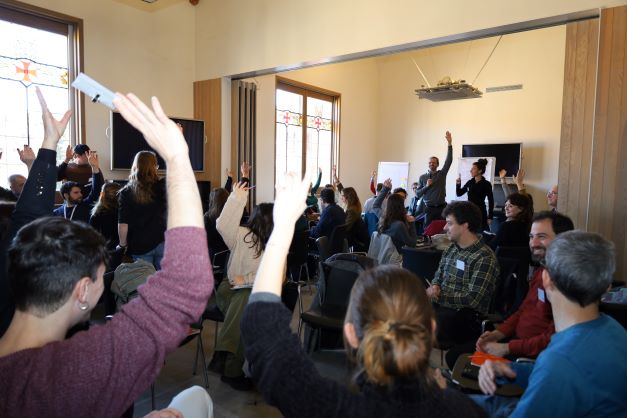The Forest Science and Technology Centre of Catalonia (CTFC), together with FOREST EUROPE, the European Forest Institute, and the Pau Costa Foundation, has co-organized a workshop with foresters, researchers, journalists, and policymakers from different regions of Europe held in Barcelona from the 7th until 9th of February. The main objective was to share the growing challenges for forest managers to prevent forest fires, as well as to discuss the role of communication and media in the reporting on these events, their consequences, but also the practices that are carried out to generate more resilient forests.
 The first day included a field trip through forest areas in the Montserrat mountain, a peri-urban forest area, historically characterized by drastic changes in its population density and landscape, and the subsequent wildfires that have affected part of its forest cover in the last 30 years. On this tour prepared by the CTFC, Pau Costa Foundation and the Provincial Diputation of Barcelona, and hosted by the El Bruc Council, participants were able to discover the plots with fuel treatments carried out on-site such as strategic forest management, prescribed burns, and extensive livestock. These actions are being carried out with the aim of better managing the wildland-urban interface and discovering new and innovative measures for wildfire risk disaster reduction. The following local multi-actors attended as speakers during the field trip: El Bruc Council, Montserrat Natural Park, the Catalan Fire and Rescue Service, Catalunya La Pedrera Foundation, and the Association of Forest Owners of Montserrat Surroundings.
The first day included a field trip through forest areas in the Montserrat mountain, a peri-urban forest area, historically characterized by drastic changes in its population density and landscape, and the subsequent wildfires that have affected part of its forest cover in the last 30 years. On this tour prepared by the CTFC, Pau Costa Foundation and the Provincial Diputation of Barcelona, and hosted by the El Bruc Council, participants were able to discover the plots with fuel treatments carried out on-site such as strategic forest management, prescribed burns, and extensive livestock. These actions are being carried out with the aim of better managing the wildland-urban interface and discovering new and innovative measures for wildfire risk disaster reduction. The following local multi-actors attended as speakers during the field trip: El Bruc Council, Montserrat Natural Park, the Catalan Fire and Rescue Service, Catalunya La Pedrera Foundation, and the Association of Forest Owners of Montserrat Surroundings.
The last days of the workshop were hosted at the Sant Pau Art Nouveau Site facilities. CTFC’s Eduard Plana and Marta Serra led the first session, “Understanding the wildfire risk management cycle and its communication”. Participants shared various experiences with stakeholders such as the Environmental Awareness project on the ecology of wildfires named MEFITU and aimed at primary and secondary school students from the Pau Costa Foundation, the Programme for the Endorsement of Forest Certification (PECF) and the communication challenges of prevention activities and during and emergency presented by the Catalan Department of Climate Action, Food and Rural Agenda and the Catalan Fire and Rescue Service. Both the talks and the interactive activity covered topics such as basic pedagogy on forest management concepts for children at the primary school level, differentiated communication strategies between the forest sector and society, and the relationship between journalists and the media with fire response entities.
One of the main conclusions of this session is that wildfire risk factors are diverse, interdependent, and interconnected. In addition, the final risk assessment is the result of the sum of variables, mainly humans, due to land use decisions and current climatic conditions that facilitate and favor extreme wildfire scenarios. “It’s essential to include and engage with all stakeholders to reduce wildfire risk. Effective communication is needed to promote a better social understanding of the role of Sustainable Forest Management in wildfire disaster risk reduction,” states Eduard Plana, CTFC researcher and coordinator of the event.
 The second session dealt with understanding and communicating the importance of wildfire risk prevention building on the role of sustainable forest management and other concepts. On this occasion, FOREST EUROPE presented its work related to the pilot of the pan-European Forest Risk Knowledge Mechanism that seeks to collect proven best practices for risk reduction of different hazards for forest areas such as fires but also disturbances, pests, and storms, among others. In addition, Alexander Held, researcher and expert in wildfire management and its media coverage shared diverse experiences and cases where everything is related, and it is important that local rural communities play a key role in landscape fire management because national authorities cannot be omnipresent and are not always capable to conduct all necessary activities in wildfire prevention. As a result, local fire management committees must be set up to play an active role.
The second session dealt with understanding and communicating the importance of wildfire risk prevention building on the role of sustainable forest management and other concepts. On this occasion, FOREST EUROPE presented its work related to the pilot of the pan-European Forest Risk Knowledge Mechanism that seeks to collect proven best practices for risk reduction of different hazards for forest areas such as fires but also disturbances, pests, and storms, among others. In addition, Alexander Held, researcher and expert in wildfire management and its media coverage shared diverse experiences and cases where everything is related, and it is important that local rural communities play a key role in landscape fire management because national authorities cannot be omnipresent and are not always capable to conduct all necessary activities in wildfire prevention. As a result, local fire management committees must be set up to play an active role.
One of the communication tools shown as an example of good practice to get different stakeholders to inform themselves and then take action is the policy brief. The most recent one, developed by FOREST EUROPE, EFI and Ph.D. Pyrolife students, was presented as an example (read here the policy brief “Reducing wildfire risks through Sustainable Forest Management”.)
On the last day the focus was on the debate and pitching of ideas created by groups of participants, intentionally mixed between researchers, communication managers, and forest experts to convey to the audience economically viable and sustainable strategies to communicate and promote sustainable forest management activities in different regions of Europe. The aim was to make the attendees understand the challenge of not only the science-media relationship but also the balance between prevention efforts and the human and economic efforts involved in reacting to wildfires in dry and extremely hot weather seasons.
Here are the take-home messages of the workshop.
Last modified: 21 June 2023










